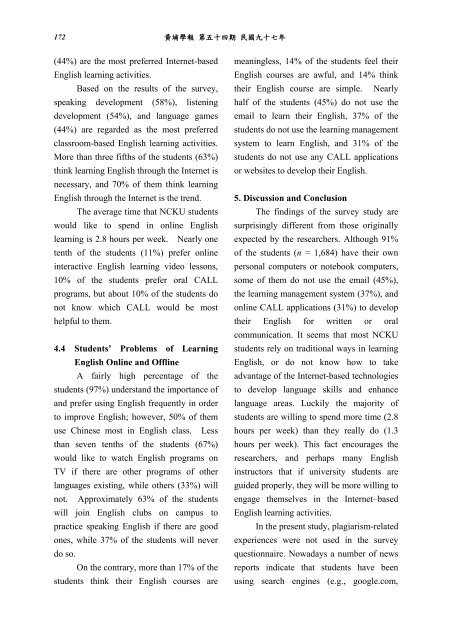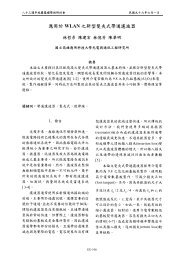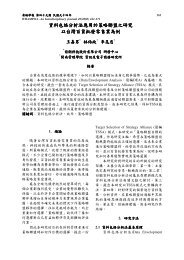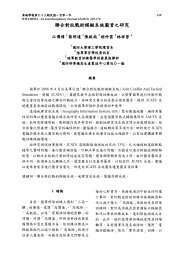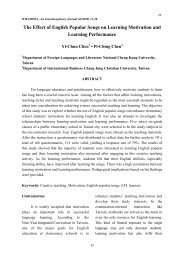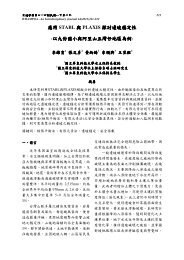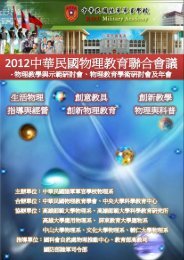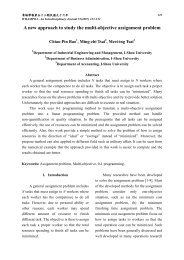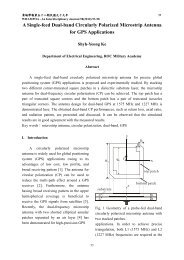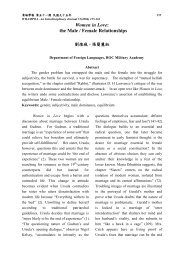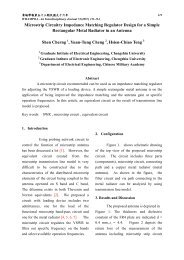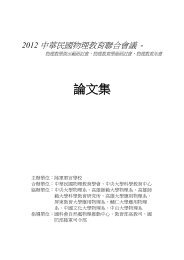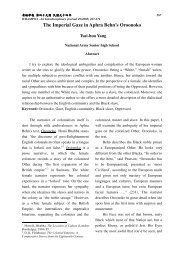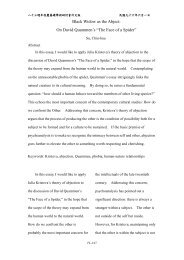An Initial Study of University Students' Needs, Preferences, and ...
An Initial Study of University Students' Needs, Preferences, and ...
An Initial Study of University Students' Needs, Preferences, and ...
- No tags were found...
Create successful ePaper yourself
Turn your PDF publications into a flip-book with our unique Google optimized e-Paper software.
172 黃 埔 學 報 第 五 十 四 期 民 國 九 十 七 年(44%) are the most preferred Internet-basedEnglish learning activities.Based on the results <strong>of</strong> the survey,speaking development (58%), listeningdevelopment (54%), <strong>and</strong> language games(44%) are regarded as the most preferredclassroom-based English learning activities.More than three fifths <strong>of</strong> the students (63%)think learning English through the Internet isnecessary, <strong>and</strong> 70% <strong>of</strong> them think learningEnglish through the Internet is the trend.The average time that NCKU studentswould like to spend in online Englishlearning is 2.8 hours per week. Nearly onetenth <strong>of</strong> the students (11%) prefer onlineinteractive English learning video lessons,10% <strong>of</strong> the students prefer oral CALLprograms, but about 10% <strong>of</strong> the students donot know which CALL would be mosthelpful to them.4.4 Students’ Problems <strong>of</strong> LearningEnglish Online <strong>and</strong> OfflineA fairly high percentage <strong>of</strong> thestudents (97%) underst<strong>and</strong> the importance <strong>of</strong><strong>and</strong> prefer using English frequently in orderto improve English; however, 50% <strong>of</strong> themuse Chinese most in English class. Lessthan seven tenths <strong>of</strong> the students (67%)would like to watch English programs onTV if there are other programs <strong>of</strong> otherlanguages existing, while others (33%) willnot. Approximately 63% <strong>of</strong> the studentswill join English clubs on campus topractice speaking English if there are goodones, while 37% <strong>of</strong> the students will neverdo so.On the contrary, more than 17% <strong>of</strong> thestudents think their English courses aremeaningless, 14% <strong>of</strong> the students feel theirEnglish courses are awful, <strong>and</strong> 14% thinktheir English course are simple. Nearlyhalf <strong>of</strong> the students (45%) do not use theemail to learn their English, 37% <strong>of</strong> thestudents do not use the learning managementsystem to learn English, <strong>and</strong> 31% <strong>of</strong> thestudents do not use any CALL applicationsor websites to develop their English.5. Discussion <strong>and</strong> ConclusionThe findings <strong>of</strong> the survey study aresurprisingly different from those originallyexpected by the researchers. Although 91%<strong>of</strong> the students (n = 1,684) have their ownpersonal computers or notebook computers,some <strong>of</strong> them do not use the email (45%),the learning management system (37%), <strong>and</strong>online CALL applications (31%) to developtheir English for written or oralcommunication. It seems that most NCKUstudents rely on traditional ways in learningEnglish, or do not know how to takeadvantage <strong>of</strong> the Internet-based technologiesto develop language skills <strong>and</strong> enhancelanguage areas. Luckily the majority <strong>of</strong>students are willing to spend more time (2.8hours per week) than they really do (1.3hours per week). This fact encourages theresearchers, <strong>and</strong> perhaps many Englishinstructors that if university students areguided properly, they will be more willing toengage themselves in the Internet–basedEnglish learning activities.In the present study, plagiarism-relatedexperiences were not used in the surveyquestionnaire. Nowadays a number <strong>of</strong> newsreports indicate that students have beenusing search engines (e.g., google.com,


